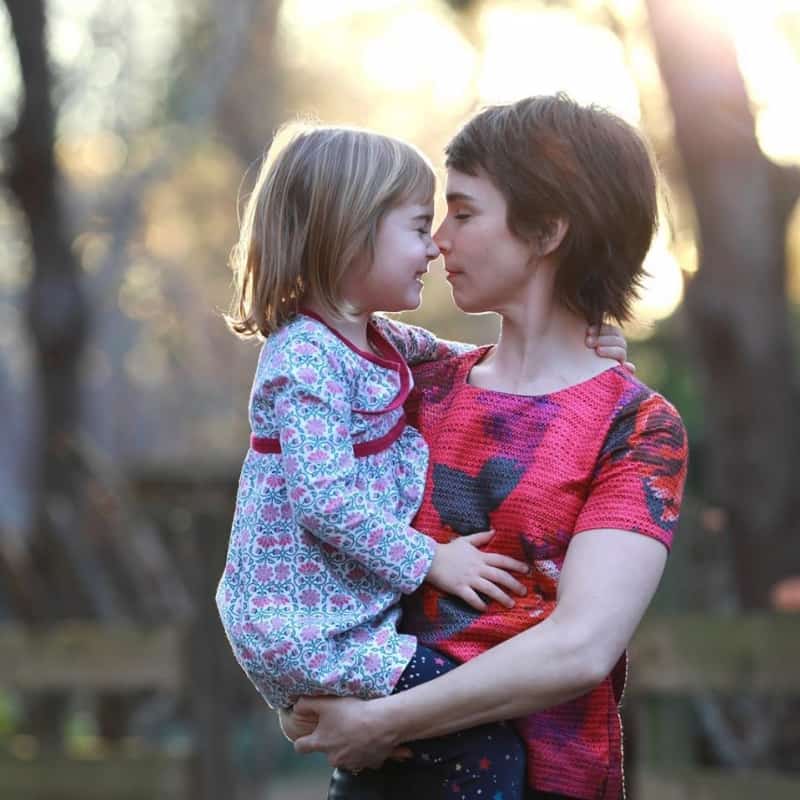
As a 41-year-old mother of two, Eli Levene had just started a new job as the executive director of a North Carolina-based childhood education nonprofit in 2016 when she went for her routine mammogram. A biopsy confirmed she had estrogen receptor-positive, HER2-positive breast cancer that had spread to her lymph nodes.
Following a mastectomy to remove her right breast and surgery to remove the impacted lymph nodes, she started chemotherapy, radiation therapy and a year-long regimen of HER-2 targeted infusions. Three months after completing her infusions, Eli found a lump in her left breast. She underwent a mastectomy to remove the breast, along with more rounds of chemotherapy, radiation therapy and infusions.
“My oncologist at Duke Cancer Institute, Dr. Paul Marcom, suggested I have a brain MRI because I’d never had one before,” Eli said. “I didn’t have any brain tumor symptoms, but he suggested routine, annual MRIs for all of his patients.”
The MRI confirmed that Eli’s breast cancer had metastasized (spread) to her brain. She was referred to radiation oncologist John Kirkpatrick, M.D., Ph.D., the radiation director at Duke Center for Brain and Spine Metastasis, in October 2018. Over the course of the next year, Eli underwent two stereotactic radiosurgery (SRS) procedures to use radiation to remove six total brain tumors.
A Passion for Research
Eli’s background in education ignited her passion for researching treatments and staying informed about the newest treatment options under study for those living with metastatic breast cancer (MBC).
“I came into this new world of which treatments worked for me and which didn’t, and it was really important to me to know what research had been done and what research was still ongoing,” Eli said. “I wanted to know how treatments had been approved and who they were working for, and which treatments were up-and-coming.”
Throughout her treatment, Eli’s role as executive director of Helps Education Fund kept her grounded in purpose. When she wasn’t at home spending time with her husband, Keith, and children, Jules and Hazel, she was absorbed in her job, often working remotely from Duke during her treatments.
She also became an MBC patient advocate to connect directly with researchers whose work might ultimately impact her. While there are treatments to extend life for MBC patients, it is considered a terminal diagnosis, with a five-year relative survival rate of only 29%.
“I attended an MBC luncheon that Susan G. Komen hosted, and it was eye-opening to sit at a table with other researchers and to hear their stories and why they chose breast cancer as their research area,” Eli said. “So many of them had a personal story like they had watched their mom pass away from breast cancer. It was very heartwarming and encouraging to hear the human side of why researchers do what they do.”
After being stable for a year, Eli had a seizure in February 2020. She underwent a craniectomy and another SRS procedure just before the COVID-19 pandemic to relieve swelling of her brain. With her anti-seizure medication affecting her vision and speech, Eli ultimately stepped down from her role at Helps Education Fund.
“I’m not a researcher or a scientist, but I have worked with researchers and scientists that are studying how brains develop and which factors affect academic performance,” Eli said. “I was very lucky to have that background going into my diagnosis with cancer and already understanding the research and how important an evidence-based approach is when you have a disease like cancer.”
When Two Worlds Collide
Having lived in North Carolina for more than 20 years, Eli was thrilled to see the launch of Komen’s MBC Collaborative Research Initiative, a first-of-its-kind collaborative research effort to unite researchers at Duke Cancer Institute and University of North Carolina (UNC) Lineberger Comprehensive Cancer Center to find cures for MBC.
“Seeing these two worlds of Duke and UNC come together has been inspiring,” Eli said. “Such important things are happening in both universities that are really important to bring us further along with the higher purpose around research and collaboration. It’s very forward-thinking.”
Her passion for breast cancer research and expanding her knowledge has also helped her to be an advocate for her mom, Jane, who was also diagnosed with stage 3 breast cancer after Eli’s diagnosis.
“It’s important to be an MBC patient advocate, but for me, it’s even more important to be a research advocate,” Eli said. “I might not be able to follow everything the researchers are saying, but I want to be able to connect as many of the dots as I can and learn how important those dots are.”
Eli has been living with MBC for four years. She undergoes chemotherapy every 21 days and has a brain MRI every three months. While she has not had any brain tumor recurrence since 2020, she will live with MBC for the rest of her life.
“I see a lot of people, including myself, struggling with side effects in treatment,” Eli said. “We need more research to find cures for MBC but also more treatments that will allow us to have a better quality of life.”
Statements and opinions expressed are that of the individual and do not express the views or opinions of Susan G. Komen. This information is being provided for educational purposes only and is not to be construed as medical advice. Persons with breast cancer should consult their healthcare provider with specific questions or concerns about their treatment.



